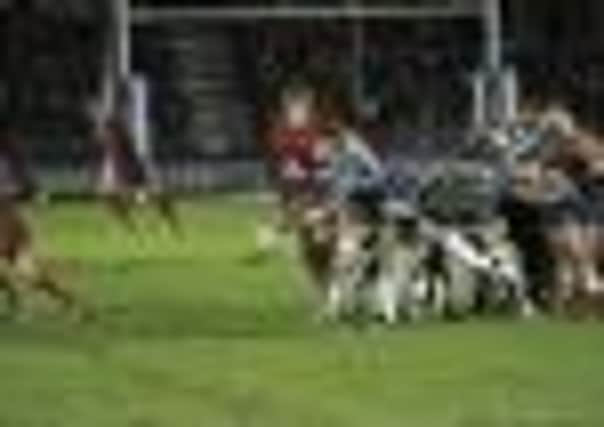‘Credit to them, you know, cheat until you’re caught’: Beaten Edinburgh skipper frustrated by Warriors’ ‘holding’ tactics


Half the pitch had been under water twenty-four hours or so before kick-off and it showed. But at least the twin teams couldn’t be faulted for ambition.
Glasgow edged the first leg of the festive 1872 Cup ties 23-14 and deservedly so after bossing three of the four quarters but things could have been a little different had the visitors got the early try that they deserved.
Advertisement
Hide AdAdvertisement
Hide AdEdinburgh were certainly first out of the blocks. When Greig Laidlaw charged down a clearance kick, had Greig Tonks passed outside to Matt Scott rather than inside to Ross Ford the capital club would surely have taken an early lead.
Instead, Glasgow scored in atypical fashion from a Ruaridh Jackson blunder, a sort of dummy pass to no one that he let go off before plucking the ball out of the air. The net result was that two defenders targetted the stand-off, who offloaded beautifully to Peter Murchie and DTH van der Merwe went in at the corner.
“We made a break and we should have scored,” Laidlaw said after the match.
“Whenever they made a break they scored and that was the difference.”
In truth, it wasn’t the only difference. Edinburgh’s fast men were far too lateral in almost everything they did and, on a night made for him, Tim Visser was far too reluctant to come off his wing in search of the ball. Glasgow had the edge up front in the bump and grind department, they dominated territory (apart from the third quarter) and they were far more incisive in the backs.
In one brilliant run, Sean Lamont handed off Scott before running right over the top of Tonks. Van der Merwe did the same to Lee Jones on the opposite wing.
But if Edinburgh’s first-up tackling left something to be desired, their captain also noted one other area where Glasgow boxed a lot cleverer… cheating.
“I was just very disappointed in the first half to say the least. We had to make our one-on-one tackles, too many of them were missed on the front line and we were getting blocked out of the line. We let them get away with murder at times, we were extremely disappointed and that won’t be happening next week. We have to make the referee aware but we should have dealt with them, it wasn’t the referee’s fault.
Advertisement
Hide AdAdvertisement
Hide Ad“Still, I was disappointed in the ref because I’d spoken to him before the game about that and they scored a couple of tries in the first half off that. Credit to them, you know, cheat until you’re caught.”
Laidlaw was seriously unamused in the aftermath and he had some cause. When Rob Harley went over for Glasgow’s second try early in the first half, Van der Merwe was engaged in a mud-wrestling match with Jones when the Edinburgh winger should have been protecting the corner in which Harley scored. It was just the most obvious example of Glasgow’s attackers taking out defenders off the ball.
At one point Harley and Stuart McInally were engaged in a long tussle with Glasgow threatening the Edinburgh line simply because the Glasgow flanker would not allow the Edinburgh No.8 to take his place in the defensive line.
Not long after he scored, Harley was at it again, holding on to David Denton long after the ball had gone in the hope of provoking a reaction.
Indeed, Harley was lucky not to get clocked for his trouble or, rather, he was lucky that, when someone eventually decided to sort him out, it was the diminutive Laidlaw who had had enough of his nonsense and started a second-half scrap with the flanker. How about picking on someone your own size?
“He was the guy who was taking guys out, tackling our guards and stuff,” exclaimed Laidlaw with indignation.
“The referee wasn’t dealing with it. One of our forwards should probably have dealt with it before it got to me. As I mentioned, we can’t let that happen next week.
“Credit to them, you cheat until you’re caught, fair play!”
It was an odd choice of words in the circumstances.